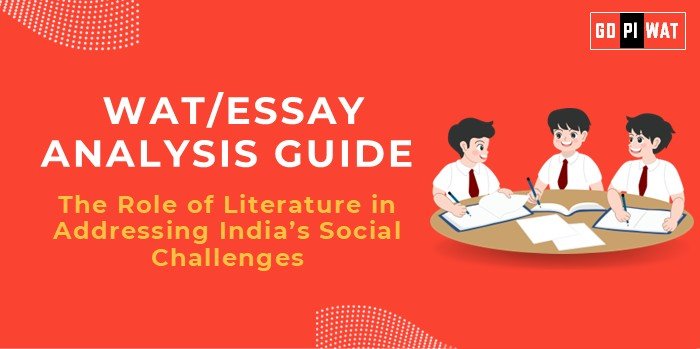📚 WAT/Essay Analysis Guide
✍️ The Role of Literature in Addressing India’s Social Challenges
🌟 Understanding the Topic’s Importance
Literature, beyond being a creative pursuit, is a medium for societal introspection and transformation. In the Indian context, it challenges deeply rooted inequalities and encourages collective action.
📋 Effective Planning and Writing
- Time Allocation: 5 minutes planning, 20 minutes writing, 5 minutes reviewing.
- Word Count: Introduction (60-70 words), Body (350-375 words), Conclusion (60-70 words).
🖋️ Introduction Techniques for Essays
- Contrast Approach: “While India boasts a literary tradition spanning millennia, its social fabric still grapples with inequality and injustice. Literature emerges as a bridge between the past and a transformative future.”
- Solution-Based Approach: “Indian literature has transitioned from chronicling to catalyzing societal change, paving the way for more equitable policies and awareness.”
📚 Structuring the Essay Body
- Achievements: Highlight transformative works and their impacts, e.g., Dalit literature and the feminist movement.
- Challenges: Discuss literacy barriers and censorship.
- Future Outlook: Advocate for digital libraries and government support.
✔️ Concluding Effectively
- Balanced Perspective: “While literature alone cannot solve India’s challenges, it lays the foundation for critical dialogue and collective action.”
- Global Comparison: “Learning from countries like Norway, India can better leverage literature to foster societal well-being.”
📝 Sample Short Essays
1. Balanced Perspective:
“Indian literature, from Tagore to contemporary writers, holds a mirror to society. Yet, its impact is limited by accessibility and freedom of expression. Addressing these gaps can amplify its transformative power.”
2. Solution-Oriented:
“To address India’s social challenges, literature must evolve with technology, enabling wider reach and deeper impact. Initiatives like mobile libraries can democratize access.”
3. Global Comparison:
“Inspired by Norway’s literary funding, India can harness its literary heritage to tackle inequality and promote inclusivity, transforming challenges into opportunities.”


